10 Hands-On Science Activities for Kids
Hands-on learning is the best kind, and science is, by nature, a hands-on learning subject. Try any or all of these science activities for kids – some generic, some specific – to get your kids – and you – excited about science and hands-on learning.
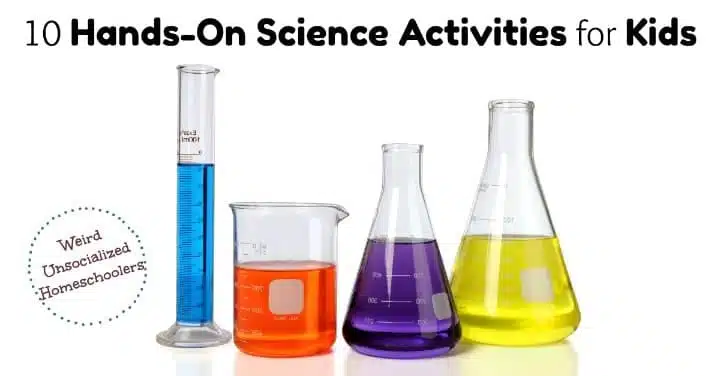
1. Make Oobleck
I don’t care how old you or your kids are. You’re never too old for Oobleck (a.k.a. “slime). Seriously. Never. Most slime recipes are similar, so find one you like and make some. Then, try some fun science experiments with your creation.
2. Build a model
There are so many possibilities with models, from Jell-O cells to Styrofoam atoms to a 3-D model of Earth’s layers. You could create a biome diorama, modeling a rainforest, desert, ocean – whatever you’d like!
3. Make a lapbook or notebook
You can find all kinds of ready-made science lapbooks at A Journey Through Learning, including general science or lapbooks for specific curricula, such as Apologia. And, there are lots of free, science-themed printable notebooking pages at Notebooking Fairy or worksheets and unit study packets at Mama’s Learning Corner.
4. Make an ABC book
I was introduced to the idea of ABC books several years ago. They are a fabulous way of allowing kids of all ages to record what they’re learning. They’re not just for younger kids either. These versatile, homemade ABC books can be great for middle and high school students, too!
The idea is that students will write anything from a simple sentence to a full paragraph (depending on age and ability) and an illustration representing each letter of the alphabet for the given topic. For example, in a science ABC book, you might see “A is for atom” or “P is for Periodic Table.”
5. Do experiments
That should probably go without saying when we’re talking about science, but sometimes we forget the fun, simple experiments. Just about anything to do with baking soda and vinegar is fun – such as erupting volcanoes or blowing up balloons.
6. Start a collection
Nature study is a great way to get hands-on with science, and it’s fun to make collections of your discoveries, such as leaves, pressed flowers, or rocks. One great way to grow a diverse rock collection is to do a rock exchange with people from other states.
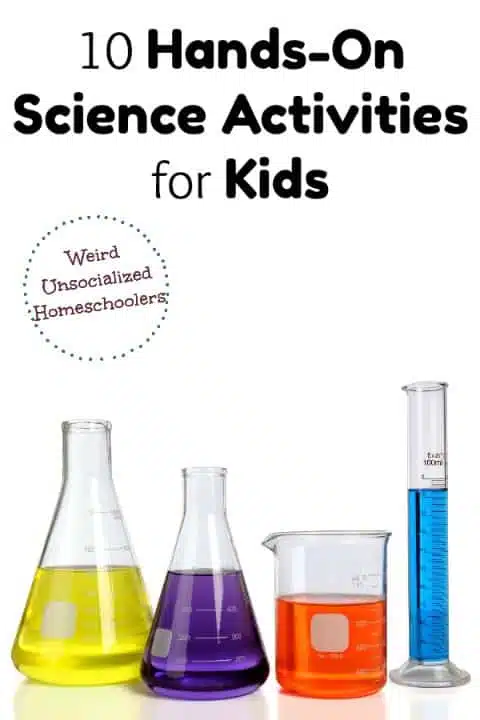
7. Read great books
Okay, so maybe reading isn’t exactly hands-on, but it’s still my favorite way to learn about people, places, and events. Enjoying biographies of the men and women who shaped science makes them a whole lot more memorable than a paragraph in a textbook. My kids and I will probably never forget Michael Faraday and his contribution to science (the dynamo).
8. Make food
It’s always a good idea to make food when you can (great hands-on fun with no storage to worry about) and science is no exception. Cooking is science in itself, but don’t forget projects such as an edible DNA model or phases of the moon with Oreos.
9. Have fun with eggs
One of my favorite experiments ever was learning about osmosis with eggs. First, you remove the shell by soaking the egg in vinegar for a few days. After that, soak it in plain water for a few days. Then, soak it in corn syrup. Record what happens with each. Learn more about osmosis through the cell membrane of an egg to find out what’s happening and why.
10. Make cards
Let your kids make their own plant, animal, bird, or {fill in the blank with their favorite scientific topic to study} cards. They can write the name and draw an illustration (or cut photos from books or magazines) on the front and include facts on the back. Use index cards and an index card file box for easy storage – or try spiral-bound index cards.
What are some of your favorite ways to enjoy hands-on science fun?
Did you enjoy those ideas? You can find lots more ideas for hands-on fun in my e-book Hands-On Learning, which includes 10 full-color, step-by-step tutorials and dozens of ideas for cross-curricular, hands-on activities. It’s free for subscribers!
You Might Also Like
Kris Bales is a newly-retired homeschool mom and the quirky, Christ-following, painfully honest founder (and former owner) of Weird, Unsocialized Homeschoolers. She has a pretty serious addiction to sweet tea and Words with Friends. Kris and her husband of over 30 years are parents to three amazing homeschool grads. They share their home with three dogs, two cats, a ball python, a bearded dragon, and seven birds.



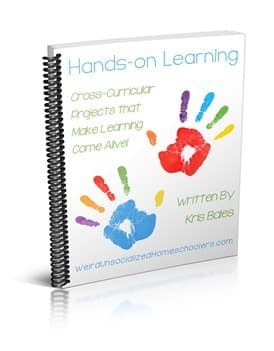
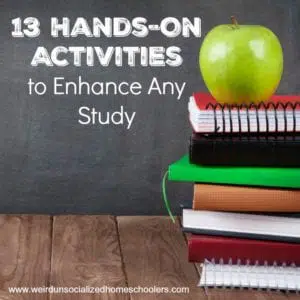
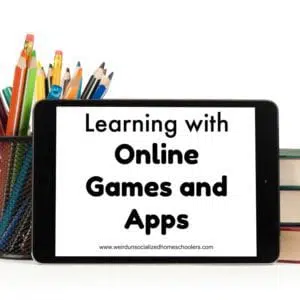

I completely agree, hands-on is one of the most effective ways to learn science, especially in the early years. Great ideas, Kris, thanks for sharing them!
I thought the vinegar would remove the shell, not the yolk. Was that a typo or am I missing something? I remember reading about that once, but I never did it.
Oops! Yes, that was a typo. I did mean to say it would remove the shell.